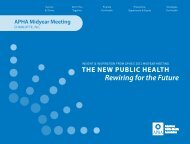EVIDENCE
missingevidence-digitalpdf-singlepages_2016
missingevidence-digitalpdf-singlepages_2016
Create successful ePaper yourself
Turn your PDF publications into a flip-book with our unique Google optimized e-Paper software.
Case study 6<br />
THE INCREASING USE OF FOOD BANKS<br />
The allegation<br />
According to its authors, the Department for Environment, Food and Rural Affairs (Defra) delayed<br />
the publication of a study looking at the growing use of emergency food aid for eight months. 31<br />
Timeline<br />
Feb - Mar 2013<br />
Jun 2013<br />
Nov 2013<br />
Feb 2014<br />
Mar 2014<br />
Defra asked a team of researchers led by the University of Warwick to conduct a Rapid Evidence<br />
Assessment of the research literature on emergency food aid. They looked at published<br />
literature, and issued a call for evidence that prompted providers of food aid and other agencies<br />
to contribute their experience.<br />
A steering committee including Defra, the Department for Work and Pensions and the<br />
Department of Health approved the report.<br />
The media reported allegations that the study was being “hidden” 32 and “suppressed.” 33<br />
Asked by a Guardian journalist to explain the delay, a Defra spokesperson said: “Government<br />
funded research projects are required to go through the necessary review and quality assurance<br />
process prior to publication. Once this process is complete, the report will be published<br />
on the government’s website.”<br />
Defra published final report. 34<br />
A study published in the BMJ found that the rise in the use of food banks “is associated with<br />
cuts to local authority spending and central welfare spending,” and that the “highest levels<br />
of food bank use have occurred where there have been the highest rates of sanctioning,<br />
unemployment, and cuts in central welfare spending.” 35<br />
How were government policy and public debate affected?<br />
Welfare Minister Lord Freud had argued in July 2013 that more people were using food banks because more<br />
of them existed and awareness of them had increased — in other words that increased supply had caused greater<br />
use, not increased demand. He rejected a link between the government’s benefit reforms and an increased use<br />
of food banks. 36 The minister’s claim could not be evaluated in the absence of evidence from the delayed report.<br />
The report contradicted the minister: it cited immediate financial crisis, often related to changes to benefits,<br />
as an important driver of food bank use.<br />
The UK government does not collect data on food aid. In the absence of systematic evidence on the use of food<br />
banks in the UK the researchers relied on studies from the USA, Canada and other countries, and on case studies<br />
from providers of food banks. Timely publication would have highlighted the gaps in the evidence base. It would<br />
also have allowed better-informed scrutiny of ministers’ claims and have required government to address the data.<br />
31 Dugan, E (2014)<br />
32 Oakeshott, I (2013)<br />
33 Buttler, P (2013)<br />
34 Lambie-Mumford, H et al (2014)<br />
35 Loopstra, R et al (2015)<br />
36 Morris, N (2013)<br />
23 SECTION 3: REASONS FOR THE DELAYED PUBLICATION OR WITHHOLDING OF GOVERNMENT RESEARCH



